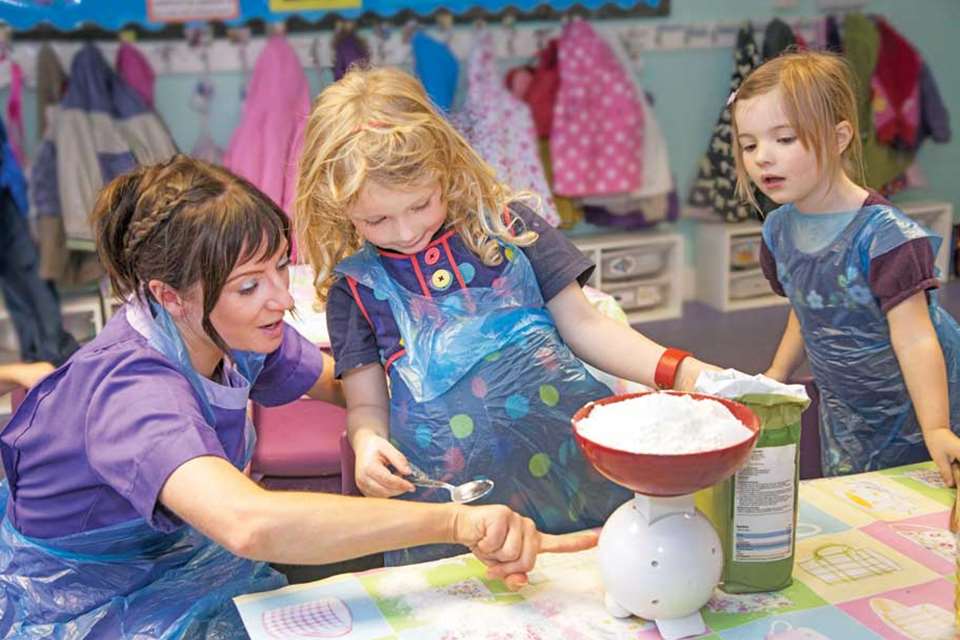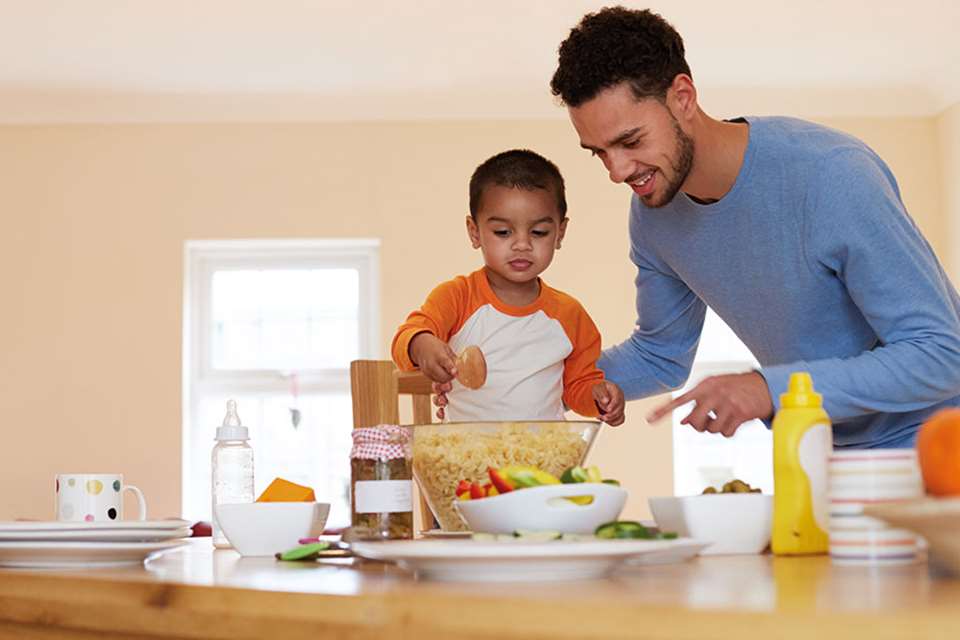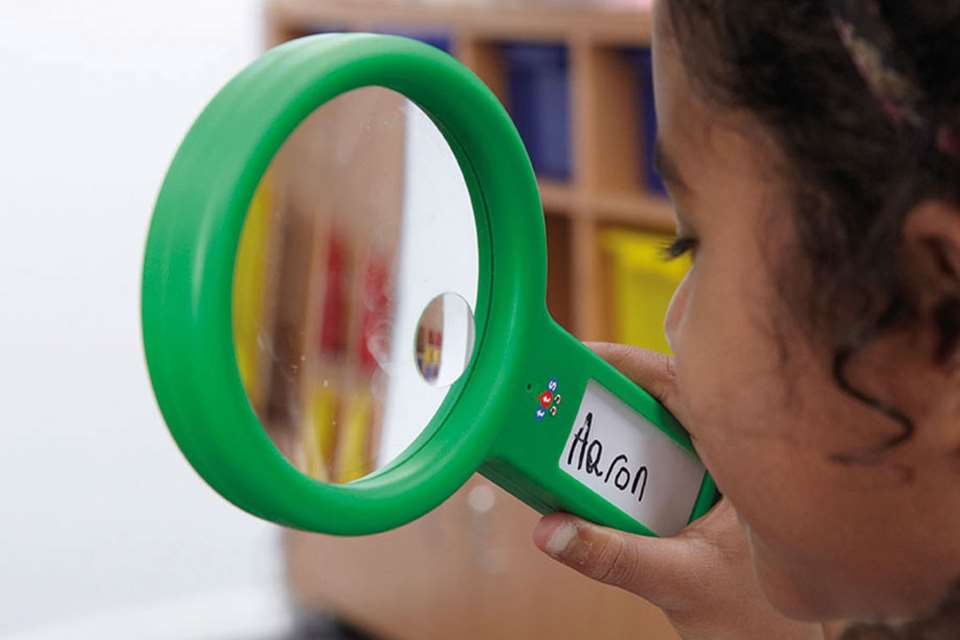Enabling Environments: Collections - Bake off!
Nicole Weinstein
Monday, July 24, 2017
Cooking with children is a great way to educate them about the science of food, finds Nicole Weinstein in the latest in her series on supporting and resourcing learning for ‘Understanding the World’

Involving young children in baking and cooking is an ideal way to introduce them to the basic science behind how and why materials change. It also has strong links to understanding the world because shopping, preparing food and cooking are everyday activities that take place in the majority of homes and are some of the first experiences that children learn to relate to.
Practitioners should use every opportunity to teach children to prepare and cook food throughout the daily nursery routine and provide plenty of kitchen utensils for group cooking activities and role play.
CHANGING MATERIALS
Children will be aware of the consequences of changes in materials when they eat ice-cream on a warm day or hold a chocolate biscuit in their hand for too long before eating it. This is an example of physical change, whereby the material can be changed back to a solid just by changing the conditions.
‘Physical changes are usually reversible,’ explains education consultant Linda Thornton. ‘However, most of the changes which take place during baking and cooking are examples of irreversible chemical change. For example, when eggs, sugar, flour and butter are combined to make a cake and then put in the oven, the sloppy mixture is converted into a solid which is firm and retains its shape. All of the ingredients have been chemically changed by combining with one another and then by being heated to a high temperature.’
Chemical change of a material alters its structure in some way, resulting in the creation of something new.
SIMPLE FORCES
Cooking and baking activities, both real ones and in role play, provide the opportunity to demonstrate to children how simple forces work.
Ms Thornton explains, ‘Forces are all around us – they make things move, change shape and balance. Children will be experiencing forces from the day they are born and will have experimented with their effects. Focusing on activities that investigate forces will give you the opportunity to nurture children’s scientific understanding by building on these early experiences.’
Use a collection of kitchen tools to show how forces are used in the kitchen. For example:
Push and pull – rolling pin, potato masher, ricer, garlic press.
Twist and turn – whisk, tin opener, lemon juicer.
Squeeze – tongs, ice-cream scoop with spring, droppers (for food colouring).
By providing a range of role-play kitchen tools, practitioners can encourage children to talk about how they are used and how they work, building on the experiences and scientific leaning that they have taken part in when cooking and baking.
‘Don’t forget to talk about health and safety issues when cooking and baking,’ Ms Thornton adds. ‘The science behind insulating materials can be introduced if you are using oven gloves when baking and cooking.’
DAILY ROUTINE
A ‘rich and varied early years curriculum’ can be implemented through well-planned activities about preparing and eating food, explains early years, education and parenting specialist Lena Engel.
‘It also provides excellent opportunities to engage the interest and involvement of parents and families,’ she adds. ‘But it is important that health and well-being is promoted through eating a healthy and well-balanced diet, and that the emphasis is placed on preparing and cooking savoury dishes, rather than cakes, sweets and biscuits.’
Here are some tips from Ms Engel on how practitioners can teach children to prepare and cook, through the daily routine:
All snacks can be fruit or vegetables and water, which the children help themselves to in small groups at a table. Children can cut fruit and pour their drinks. Adults should trust children to deal sensibly with food and choose when they eat their snack within a morning or afternoon session.
Initiate children into cooking by researching books with them for recipes, making lists of ingredients and shopping for them locally when possible. Practitioners should support children to learn independence skills by trusting them to practise washing and cutting vegetables and doing simple cooking. These activities also develop fine motor skills.
Offer opportunities throughout the year for children to grow and tend their own vegetables in garden plots and tubs. These can be harvested and eaten together.
Support children to taste and savour vegetables, cereals, salads, herbs, fruits, dairy products, fish and meats from around the world and to name them correctly.
Provide a range of kitchen utensils that enable children to examine all sorts of food and to wash, cut and prepare it safely. Also, ensure there are cooking facilities that can be accessed safely. Provide plenty of cutting boards, sharp knives, mixing bowls and wooden or plastic spoons, potato mashers and peelers, as well as a range of safe electric blenders and food processors that can be used by staff with small groups of children.
Educate children about where food originates from. Practitioners can inform themselves about the history of food in Britain so that they can be more knowledgeable in their explanations.
It is important for children to understand that farmers and smallholders around the world have always and continue to grow food and breed animals for food, and that technology has been developed to help preserve food, so that it can be transported and delivered to shops. Technology such as fridges and cooking facilities allows food to be transformed through freezing, chilling and cooking.
USEFUL RESOURCES
Reflections on Learning (www.reflectionsonlearning.co.uk) sells a wide range of role-play kitchens and kitchen tools and accessories that can be used to reinforce the scient ific experiences introduced when cooking and baking. Try the Kitchenware Set, £24.99; the Kitchen Set, £62.99; Le Toy Van Cookie Set, £6.99; and Jumbo Eyedroppers, £12.99.
ific experiences introduced when cooking and baking. Try the Kitchenware Set, £24.99; the Kitchen Set, £62.99; Le Toy Van Cookie Set, £6.99; and Jumbo Eyedroppers, £12.99.
From www.cosydirect.com: Basic Cookery Set, 32pk, £29.99; Cooking Apron, 4pk, £13; Multicoloured Scales, 4pk, £9.99; Patterns in Food, 20pk, £27.99; Healthy Triangle Stones, £29.99; Table Top Cooker, £82.50; and Pound Shop Home Corner Mega Set, 32pk, £54.99.
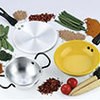 Hope Education (www.hope-education.co.uk) offers: Cooking Essentials Pack, £129.99; Global Cookery Pack, 4pk, £69.99; Role Play Multi-Cultural Cooking Set, £28.99; Icing Bottle and Spatula, £3.49; Children’s Ten Piece Baking Set, £6.99; Baking and Modelling Set, £33.99; and Classroom Kitchen Set, £59.99.
Hope Education (www.hope-education.co.uk) offers: Cooking Essentials Pack, £129.99; Global Cookery Pack, 4pk, £69.99; Role Play Multi-Cultural Cooking Set, £28.99; Icing Bottle and Spatula, £3.49; Children’s Ten Piece Baking Set, £6.99; Baking and Modelling Set, £33.99; and Classroom Kitchen Set, £59.99.
From Wesco (www.wesco-eshop.co.uk): Fantasy Cake Moulds, Castles, £17.20; and Trains, £11.90.
YPO (www.ypo.org.uk) offers: Kitchen Tools, 13pk, £69.20; and Solid Hardwood Kitchen, £262.50.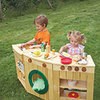
TTS has role play kitchens www.tts-group.com.
Finally, Early Years Resources (www.earlyyearsresources.co.uk) has: First Bakery Pack, £109.95; Fruit and Vegetable Cutting Pack, £39.95; and Fruit and Vegetable Posters, £8.95.
COOKING ACTIVITY
By Lena Engel
Children love handling new potatoes. They can wash them easily in a kitchen bowl at the table and they can then be placed by the adult on a hob to cook for 20 minutes. When they are drained and left to cool, children can slice them and eat them plain. By taking them though the process of cleaning and cooking, they learn that boiling softens the originally hard vegetables.
Alongside the potatoes, children can make houmous from chickpeas, tahini, garlic and olive oil blended in an electric blender. Dipping the potatoes slices in houmous creates an alternative taste. Through these first-hand experiences, children learn to make scientific connections and understand how they can transform what they eat by combining tastes and textures.
CASE STUDY: TOPS DAY NURSERY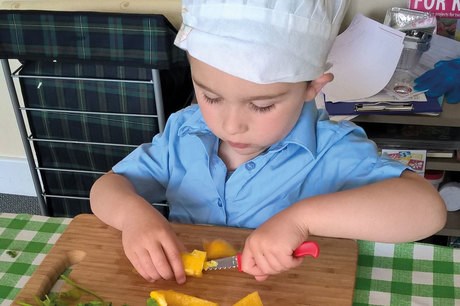
Pasta salad, chickpea curry, beef lasagne and baked oatcake are just some examples of the food that children at Tops Gillingham Nursery in Dorset prepare in their weekly cooking class. The extra-curricular activity, which takes place over two hours, involves eight pre-school children, the nursery chef and a practitioner.
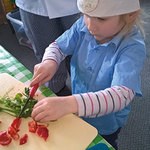 Manager Melanie Lockyer says, ‘All the recipes are taken from our menu and are based on no-added-sugar options. Children are involved in every part of the cooking process and enjoy making and eating their own food. Feedback from our parents shows children are happy to eat the food they bring home, but they will often refuse to eat the same recipes at home.
Manager Melanie Lockyer says, ‘All the recipes are taken from our menu and are based on no-added-sugar options. Children are involved in every part of the cooking process and enjoy making and eating their own food. Feedback from our parents shows children are happy to eat the food they bring home, but they will often refuse to eat the same recipes at home.
‘We talk through each step of the recipe and children each have their own pieces of equipment to make the dish. They learn about the different textures; what happens to ingredients when you mix them together; they weigh out the ingredients; they look at where the ingredients come from; and, once cooked, they observe the changes that happen to the dish.
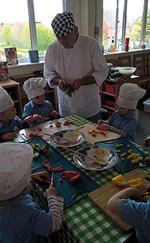 ‘For example, when making baked oatcake the children were really interested in the changes that were made to the ingredients after cooking. The children noticed that the raspberries were soft ingredients, but were hard after baking.
‘For example, when making baked oatcake the children were really interested in the changes that were made to the ingredients after cooking. The children noticed that the raspberries were soft ingredients, but were hard after baking.
‘The children have been given the opportunity to practise lots of skills. We have seen an improvement in listening skills, following simple instructions, and eye-hand co-ordination. We have also observed an improvement in the use of one-handed tools and maths.’
MORE INFORMATION
For recipes, nutrition advice and ideas on cooking with children, visit: www.nurseryworld.co.uk/recipes
www.historic-uk.com/CultureUK/History-of-British-Food
www.foodafactoflife.org.uk/Sheet.aspx?siteId=0§ionId=61&contentId=43
Email Lena Engel at lenahelpsparents@gmail.com for parenting advice, guidance and counselling; and at 1lenaengel@gmail.com for early years and education support and training
‘A parent’s guide to…early science’ is at www.nurseryworld.co.uk
See also ‘Learning from Froebel…Occupations’, which includes scientific concepts and notions of reversible and irreversible change, at www.nurseryworld.co.uk


